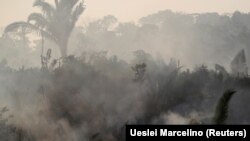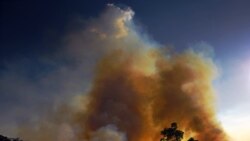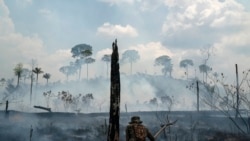Since the election of President Jair Bolsonaro in 2018, Brazil’s environmental policies have been in the international spotlight, as he made clear his intent to open up the Amazon rainforest for commerce and end territorial protections for indigenous communities.
Between August 2019 and July 2020, deforestation in the Amazon hit a 12-year high, rising 9.5 percent from the previous season, according to INPE, the country’s space research agency.
Yet on December 27, 2020, Vice President Hamilton Mourao, who is the president of the National Council for the Legal Amazon, boasted in an op-ed for the newspaper O Estado de Sao Paulo about the administration’s achievements on the “preservation, protection and sustainable development” of the rainforest.
The article, titled “Everything for the Amazon!”, contended that the military operations in the Amazon have been a big success.
"With operations in the field of Operation Green Brazil 2, with the Armed Forces in support ... we have advanced in the fight against environmental crimes and other illegal activities, obtaining significant results," Mourao wrote.
His claim of significant results is misleading. Mourao supports it by cherry picking data from deforestation in 2020, including statistics only from June until November. He ignores both the overall increase in deforestation in 2020 and the spread of the coronavirus in indigenous communities. Nor does he mention measures his government took that undercut enforcement of environmental protections.
Both 2019 and 2020 under Bolsonaro's administration saw considerably more deforestation than any year in the prior decade. In 2020, 3,800 square miles were deforested. In 2019, deforestation hit a 10-year high of more than 4,200 square miles, up 34 percent compared to 2018.
As Mourao noted, fires declined in July and September from 2019 acres burned. In the first six months of last year, however, deforestation was nearly 21 percent higher. In June, the number of fires in the Amazon biome (2,248) was the highest since 2007, according to INPE’s Fire Program (Programa Queimadas).
Although fires declined by 5 percent in August 2020 compared to 2019, the number of fires increased by 7.8 percent in protected areas, according to Greenpeace. And October 2020 recorded the largest area lost to deforestation in the past decade.
The historic 2019 fire season was driven in large part by the so-called “Day of Fire” action on August 10, when rural producers, empowered by Bolsonaro’s rhetoric, orchestrated day of burning around Novo Progresso in the state of Para.
Following the ravaging Amazon fires that month, however, Bolsonaro was pressured into taking action. That included "Operation Green Brazil," a temporary effort that tasked the military with fighting environmental crimes, and a decree prohibiting fires for 120 days.
Operation Green Brazil has since been extended, and will likely continue until Bolsonaro’s term ends in 2022. And now, "Operation Green Brazil 2," mentioned by the vice president in his op-ed, is another expansion. It was launched in May 2020 to fight increasing fires during the coronavirus pandemic. Both initiatives have been criticized by experts for their inefficiency, limited success and lack of clear objectives, as reported by news organizations including The Intercept and The Washington Post.
Monitoring environmental crimes in Brazil involves extensive intelligence and field work by the Brazilian Institute of Environment and Renewable Natural Resources (IBAMA). The agency is in charge of environmental law enforcement, including monitoring deforestation and issuing environmental licenses. If illegal operations are discovered, trained environmental investigators carry out field missions to shut the operations down and destroy equipment to prevent their resumption.
But IBAMA has suffered cuts in resources and personnel, making its work more difficult. Meanwhile, the armed forces budget is 10 times bigger than IBAMA’s, as The Intercept reported in July 2020, spending around $11 million per month, “an average budget of one year for the IBAMA inspection sector.”
Bolsonaro’s government has shifted the enforcement lead from IBAMA to the military, which critics say lacks proper training and has led to several failed missions. Those included an August 2020 effort to destroy the equipment of illegal miners in the northern state of Para, according to a Washington Post investigative report. "[M]embers of the Brazilian military … fueled their helicopters too early, at an airport too close to the mines. News of the operation quickly leaked. A story hit the press. The miners vanished into the forest,” the Post found.
Fires are not unusual in the Amazon: Every dry season, which happens between August and October, sees an uptick in fires, either naturally, set by people in traditional communities, or lit to clear pasture by small ranchers.
But in the past two years, mounting evidence shows how fires are done by land grabbers. As Marcio Astrini, executive secretary of the Climate Observatory, a coalition of environmental organizations, told Polygraph.info in September, “fires for cleaning pasture or grass doesn’t create these columns of fire in the Amazon … what creates these columns are environmental crimes.”
Bolsonaro took office on January 1, 2019. His campaign rhetoric and subsequent ministerial picks have rolled back environmental protections and undercut environmental agencies and programs to preserve indigenous lands.
In the first year of his government, IBAMA's budget was cut by 25 percent. Its funding for prevention and control of forest fires was also reduced 23 percent, Reuters reported.
The National Indian Foundation (FUNAI) suffered a 40 percent cut under the administration's 2020 budget, particularly for programs to uphold Indigenous rights. This was "the first time that government planning does not include indigenous rights guaranteed by the Constitution," according to FUNAI's employee association.
The push for relaxing environmental protections continued during the coronavirus pandemic. In April, Brazil’s minister of the environment, Ricardo Salles, fired the director and two IBAMA inspection chiefs. The firings followed a large-scale agency operation against land grabbers in indigenous lands in the state of Pará. Salles claimed the firings were unrelated.
On December 24, 2020, Supreme Court justice Carmen Lucia asked President Bolsonaro and Salles to provide the annual data on deforestation and measures adopted by the government in the Amazon. She made her request in response to a suit by the Sustainability Network party, which accused the government of failing to carry out environmental preservation policies and demanded concrete measures to control deforestation.
In response, the Bolsonaro government denied the accusations, citing use of the military and the 120-day ban on fires as evidence of its conservation effort.








